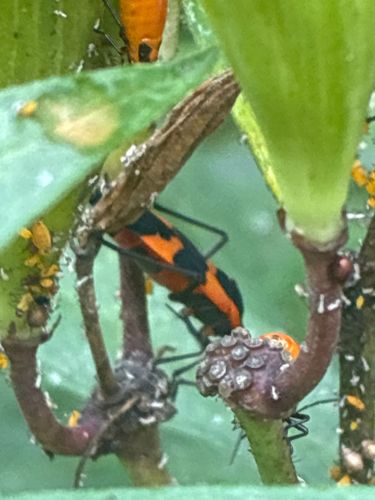Large Milkweed Bug
Scientific Name: Oncopeltus fasciatus
Order & Family: Order: Hemiptera (True Bugs), Family: Lygaeidae (Seed Bugs)
Size: Adults typically range from 10 to 18 mm (0.4 to 0.7 inches) in length.

Natural Habitat
Found in areas where milkweed plants grow, such as fields, meadows, gardens, roadsides, and open woodlands. Their presence is directly tied to the availability of milkweed.
Diet & Feeding
Primarily feeds on the seeds of milkweed plants (Asclepias species). They use their proboscis to pierce the seed and extract nutrients. Less commonly, they might feed on other plants or scavenge.
Behavior Patterns
Milkweed bugs are often found in aggregations on milkweed plants, particularly on the seed pods. They use their piercing-sucking mouthparts to feed on seeds. They undergo incomplete metamorphosis, meaning they hatch from eggs as nymphs that resemble smaller versions of the adults, molting several times before reaching full maturity.
Risks & Benefits
Generally considered harmless to humans and pets. Their primary 'risk' is to the milkweed plant's seed production, as heavy infestations can reduce the viability of seeds. However, they also play a role in the natural ecosystem as part of the food web. They are not known to damage other crops or plants significantly.
Identified on: 8/23/2025